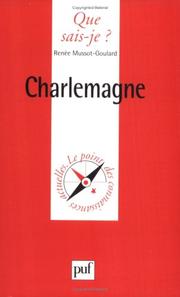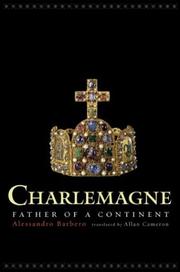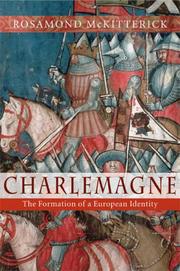| Listing 1 - 6 of 6 |
Sort by
|
Book
ISBN: 9782200244484 2200244487 Year: 2010 Publisher: Paris: Armand Colin,
Abstract | Keywords | Export | Availability | Bookmark
 Loading...
Loading...Choose an application
- Reference Manager
- EndNote
- RefWorks (Direct export to RefWorks)
Carolingiens (dynastie) --- Empire carolingien --- France --- Allemagne --- 768-814 (Charlemagne) --- 687-987 (Carolingiens) --- 843-918
Book
ISSN: 09386432 ISBN: 9783775222013 3775222014 Year: 2012 Volume: 16 Publisher: Hannover: Hahn,
Abstract | Keywords | Export | Availability | Bookmark
 Loading...
Loading...Choose an application
- Reference Manager
- EndNote
- RefWorks (Direct export to RefWorks)
Carolingians --- Carolingiens --- History --- Sources. --- Histoire --- Sources --- Charlemagne, --- Germany --- Allemagne --- Carolingians - History - Sources --- Charlemagne, - Emperor, - 742-814 --- Germany - History - 843-918 - Sources --- Empire carolingien --- DROIT --- 768-814 (Charlemagne) --- HISTOIRE --- SOURCES --- MOYEN AGE

ISBN: 2130494927 9782130494928 Year: 1998 Volume: 471 Publisher: Paris: PUF,
Abstract | Keywords | Export | Availability | Bookmark
 Loading...
Loading...Choose an application
- Reference Manager
- EndNote
- RefWorks (Direct export to RefWorks)
Rois et souverains --- 929 CHARLEMAGNE --- Kings and rulers --- Carolingians. --- Charlemagne, --- France --- History --- Rois et souverains - France - Biographies --- Empire carolingien --- Charlemagne (charles i le grand, roi des francs, des lombards et empereur d'occident), 742-814 --- 768-814 (charlemagne)

ISBN: 0520239431 Year: 2004 Publisher: Berkeley ; Los Angeles ; London University of California Press
Abstract | Keywords | Export | Availability | Bookmark
 Loading...
Loading...Choose an application
- Reference Manager
- EndNote
- RefWorks (Direct export to RefWorks)
Charlemagne, --- France --- Europe --- Kings and rulers --- History --- Karol Wielki, --- Karl --- Carolus Magnus, --- Shārlmān, --- Charles the Great, --- Karl Velikiĭ, --- Carlo Magno, --- Carlos Magno, --- Karolus Magnus, --- Karl the Great, --- Carlomagno, --- Karl den store, --- شارلمان، --- Rome --- Charlemagne --- Biography --- To 987 --- 392-814 --- Charles the Great [Holy Roman Emperor] --- Empire carolingien --- Charlemagne (charles i le grand, roi des francs, des lombards et empereur d'occident), 742-814 --- Rois et souverains --- Histoire --- 768-814 (charlemagne) --- Biographies --- Jusqu'a 987 --- 392- 814
Book
ISBN: 9782503545547 9782503558363 2503558364 2503545548 Year: 2012 Volume: 15 Publisher: Turnhout: Brepols,
Abstract | Keywords | Export | Availability | Bookmark
 Loading...
Loading...Choose an application
- Reference Manager
- EndNote
- RefWorks (Direct export to RefWorks)
Imprégnés de leur rôle de vicaires du Christ, les empereurs carolingiens se voulaient protecteurs de leurs peuples, législateurs et juges, mais aussi recteurs de l’Église. Ils ont élaboré un idéal de gouvernement ambitieux, visant à corriger, étendre et guider la société chrétienne.À l’échelle de la Gaule, de l’Italie, de leurs conquêtes en Germanie et en Espagne, Charlemagne et Louis le Pieux pouvaient-ils réaliser leur plan ? Confrontés au problème essentiel des distances, ils ont relevé le défi en misant sur la délégation hiérarchique et les communications. Leurs efforts ont déterminé la nature de leurs échanges, mais aussi leurs limites et le destin de leur empire.L’enquête utilise un vaste éventail documentaire – actes diplomatiques, documents législatifs et correspondances. Elle tient compte des aspects matériels et techniques des déplacements et de la circulation des personnes. En considérant la rencontre et les communications à distance d’un point de vue anthropologique, l’auteur propose une étude des réseaux qui éclaire les modes de transmission de l’information et l’exercice du pouvoir.Au-delà des considérations propres à l’histoire des VIIIe-IXe siècles, le livre démontre l’intérêt d’aborder les réalités politiques prémodernes du point de vue des défis à la fois technologiques et relationnels que présentent les distances géographiques, le mouvement des hommes, les rencontres et les communications.
Carolingians --- Carolingiens --- History --- Histoire --- Charlemagne, --- Louis --- France --- Holy Roman Empire --- Saint Empire romain germanique --- Kings and rulers --- Biography. --- Rois et souverains --- Biographies --- Élites --- --France --- --Moyen âge, --- Transport --- --Communication --- --VIIIe-IXe s., --- Franks --- Politics and government --- Charlemagne --- Louis I --- Civilization, Medieval --- Medieval civilization --- Middle Ages --- Civilization --- Chivalry --- Renaissance --- Moyen âge, 476-1492 --- Communication --- VIIIe-IXe s., 701-900 --- Élite (sciences sociales) --- Crises politiques --- Transports et communications --- Empire carolingien --- 768-814 (Charlemagne) --- 814-840 (Louis Ier) --- Moyen âge

ISBN: 9780521716451 9780521886727 0521716454 0521886724 9780511803314 9780511397264 0511397267 0511398034 9780511398032 9780511402708 0511402708 9780511404252 0511404255 0511803311 9780511398841 0511398840 0511400837 9780511400834 9786611383817 6611383816 9780511400834 1107186889 1281383813 0511396538 9781107186880 9781281383815 9780511396533 Year: 2008 Publisher: Cambridge, UK ; New York : Cambridge University Press,
Abstract | Keywords | Export | Availability | Bookmark
 Loading...
Loading...Choose an application
- Reference Manager
- EndNote
- RefWorks (Direct export to RefWorks)
Charlemagne is often claimed as the greatest ruler in Europe before Napoleon. This magisterial study re-examines Charlemagne the ruler and his reputation. It analyses the narrative representations of Charlemagne produced after his death, and thereafter focuses on the evidence from Charlemagne's lifetime concerning the creation of the Carolingian dynasty and the growth of the kingdom, the court and the royal household, communications and identities in the Frankish realm in the context of government, and Charlemagne's religious and cultural strategies. The book offers a critical examination of the contemporary sources and in so doing transforms our understanding of the development of the Carolingian empire, the formation of Carolingian political identity, and the astonishing changes effected throughout Charlemagne's forty-six year period of rule. This is a major contribution to Carolingian history which will be essential reading for anyone interested in the medieval past. Rosamond McKitterick has also received the 2010 Dr A. H. Heineken Prize for History for her research into the Carolingians.
Carolingians --- Carlovingians --- Carolinians --- History --- Charlemagne, --- Karol Wielki, --- Karl --- Carolus Magnus, --- Shārlmān, --- Charles the Great, --- Karl Velikiĭ, --- Carlo Magno, --- Carlos Magno, --- Karolus Magnus, --- Karl the Great, --- Carlomagno, --- Karl den store, --- شارلمان، --- France --- Holy Roman Empire --- Kings and rulers --- Charles the Great [Holy Roman Emperor] --- Biography --- Carolingiens --- History. --- Histoire --- Saint Empire romain germanique --- Biography. --- Rois et souverains --- Biographies --- Carolingians - History --- Charlemagne, - Emperor, - 742-814 --- France - Kings and rulers - Biography --- Holy Roman Empire - Kings and rulers - Biography --- France - History - To 987 --- Holy Roman Empire - History - To 1517 --- Charlemagne (0742-0814) --- Empire carolingien --- 768-814 (Charlemagne) --- 840-924
| Listing 1 - 6 of 6 |
Sort by
|

 Search
Search Feedback
Feedback About UniCat
About UniCat  Help
Help News
News